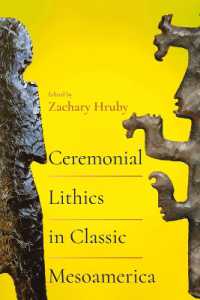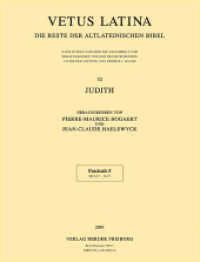- ホーム
- > 洋書
- > ドイツ書
- > Humanities, Arts & Music
- > Music
- > history of music
Description
(Text)
Martin Greve: Introduction Bülent Aksoy: Preliminary Notes on the Possibility (or Impossibility) of Writing Ottoman Musical History Ralf Martin Jäger: Concepts of Western and Ottoman Music History Ruhi Ayangil: Thoughts and Suggestions on Writing Turkish Music History Ersu Pekin: Neither Dates nor Sources: A Methodological Problem in Writing the History of Ottoman Music Nilgün Dogrusöz: From Anatolian Edvâr (Musical Theory Book) Writers to Abdülbâkî Nâsir Dede: An Evaluation of the History of Ottoman/Turkish Music Theory Walter Feldman: The Musical "Renaissance" of Late Seventeenth Century Ottoman Turkey: Reflections on the Musical Materials of Ali Ufkî Bey (ca. 1610-1675), Hâfiz Post (d. 1694) and the "Marâghî" Repertoire Kyriakos Kalaitzidis: Post-Byzantine Musical Manuscripts as Sources for Oriental Secular Music: The Case of Petros Peloponnesios (1740-1778) and the Music of the Otto-man Court Gönül Paçaci: Changes in the Field of Turkish Music during the Late Ottoman/Early Republican Era Arzu Öztürkmen: The Quest for "National Music": A Historical-Ethnographic Survey of New Approaches to Folk Music Research Okan Murat Öztürk: An Effective Means for Representing the Unity of Opposites: The Development of Ideology Concerning Folk Music in Turkey in the Context of Nationalism and Ethnic Identity Süley-man Senel: Ottoman Türkü Fikret Karakaya: Do Early Notation Collections Represent the Music of their Times? Sehvar Besiroglu: Demetrius Cantemir and the Music of his Time: The Concept of Authenticity and Types of Performance Andreas Haug: Reconstructing Western "Monophonic" Music Recep Uslu: Is an Echo of Seljuk Music Audible? A Methodological Research
(Table of content)
Martin Greve: Introduction Bülent Aksoy: Preliminary Notes on the Possibility (or Impossibility) of Writing Ottoman Musical History Ralf Martin Jäger: Concepts of Western and Ottoman Music History Ruhi Ayangil: Thoughts and Suggestions on Writing Turkish Music History Ersu Pekin: Neither Dates nor Sources: A Meth-odological Problem in Writing the History of Ottoman Music Nilgün Dogrusöz: From Anatolian Edvâr (Musical Theory Book) Writers to Abdülbâkî Nâsir Dede: An Evaluation of the History of Ottoman/Turkish Music Theory Walter Feldman: The Musical "Renaissance" of Late Seventeenth Century Ottoman Turkey: Reflections on the Musical Materials of Ali Ufkî Bey (ca. 1610-1675), Hâfiz Post (d. 1694) and the "Marâghî" Repertoire Kyriakos Kalaitzidis: Post-Byzantine Musical Manuscripts as Sources for Oriental Secular Music: The Case of Petros Peloponnesios (1740-1778) and the Music of the Otto-man Court Gönül Paçaci: Changes in the Field of Turk-ish Music during the Late Ottoman/Early Republican Era Arzu Öztürkmen: The Quest for "National Music": A Historical-Ethnographic Survey of New Approaches to Folk Music Research Okan Murat Öztürk: An Effective Means for Representing the Unity of Opposites: The Devel-opment of Ideology Concerning Folk Music in Turkey in the Context of Nationalism and Ethnic Identity Süley-man Senel: Ottoman Türkü Fikret Karakaya: Do Early Notation Collections Represent the Music of their Times? Sehvar Besiroglu: Demetrius Cantemir and the Music of his Time: The Concept of Authenticity and Types of Performance Andreas Haug: Reconstructing Western "Monophonic" Music Recep Uslu: Is an Echo of Seljuk Music Audible? A Methodological Research
(Author portrait)
Martin Greve studierte Musikwissenschaft, Vergleichende Musikwissenschaft (Musikethnologie) und Sinologie. Er war wissenschaftlicher Mitarbeiter an der Technischen Universität Berlin, später freier Mitarbeiter der Berliner Ausländerbeauftragten und freiberuflicher Journalist. Er schreibt seit vielen Jahren über türkische Kultur in der Türkei, in der europäischen Diaspora und in Deutschland. Als Musikwissenschaftler und Ethnologe lehrt Greve regelmäßig in Basel, Berlin, Stuttgart und Köln, seit 2006 ist er Leiter des Studiengangs "Türkische Musik" am Konservatorium Rotterdam.








